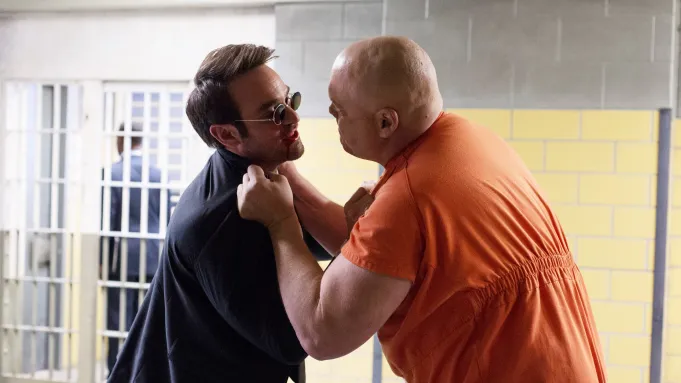If you click on a link and make a purchase we may receive a small commission. Read our editorial policy.
As Marvel's Judgment Day continues, let's revisit the unexpected creative team of Alan Moore and Rob Liefeld
The 1998 Judgment Day miniseries that redefined the Awesome Universe (remember that?) comes under the microscope

Okay, so apparently the Judgment Day that everyone is talking about is neither a Judge Dredd storyline from 1992, nor a Justice League crossover from 1994. It is, apparently, a storyline that touches multiple superheroes and superhero teams, written by a critically acclaimed and beloved British writer… so, obviously, it’s the Awesome Comics event by Alan Moore and Rob Liefeld from 1997 and ‘98, right…?
Ostensibly a spin-off of Moore’s fan-favorite Supreme run, Judgment Day saw Moore apply his revisionist eye to the entire universe of Liefeld’s creations with a particular interest in Youngblood, the very first Image Comics title and one of Liefeld’s most high-profile creations. By 1997, Liefeld and Image were on the outs, which led to the creation of Awesome Comics – a new publisher with the express focus on Liefeld’s characters. And what better way to get attention for the new publisher than a reboot courtesy of the writer behind Watchmen, drawn by the man who’d created or co-created the majority of the universe in the first place?
Judgment Day ran four and a half issues, which – because it was the '90s – were numbered Judgment Day Sourcebook #1, Judgment Day #α, Judgment Day #Ω, Judgment Day #3, and Judgment Day Aftermath #1. (The Sourcebook is the 'half' issue, because it’s mostly background material with just a six-page prelude in terms of comic strip material; it’s so non-essential that it was entirely absent from the one collected edition of this strip, published back in 2003.) The overly-complicated numbering system was applied to a story that was, despite its repeated use of flashbacks to characters and situations making their first appearance, as straight-forward and simple as any superhero event published in the past few decades.
The plot of Judgment Day is one that makes the title enjoyably literal. Arriving home after a night of drinking, Knightsabre passes out in the bedroom of fellow Youngblood member Riptide while waiting to proposition her; the next morning, he wakes up covered in her blood, with her corpse lying beside him. He is, understandably, suspected of drunkenly killing her after being rejected, but remembers nothing. Put on trial by his fellow superheroes, the series’ hook is beautifully straightforward: how will Knightsabre be judged – and will he be the only one to face judgment?!?
Eventually, it emerges that Knightsabre wasn’t the murderer after the defense establishes the existence and backstory of a magical book that allows its owner not only to read about their own future, but change it by literally rewriting their destiny. Riptide, it turns out, was the descendent of a former owner of the book, and was murdered by Sentinel, another member of the team who was themselves a former owner of the book who had used it to transform himself into the superhero that he’d become. Upon this discovery, Sentinel turns on his fellow heroes before being captured and imprisoned for his actions.
All of this sets up Moore’s plans for a Youngblood reboot, as the team splits up in the wake of what has happened, only to reform with an almost entirely new line-up immediately afterwards; New Men, Maximage, and Glory all get similar teases in the Aftermath issue, prepped for a new age of Awesome Comics that never actually arrived.

Even with an art team that sees the likes of Gil Kane, Dan Jurgens, and Chris Sprouse offer support to the afore-mentioned Liefeld, there’s a curious lack of energy throughout Judgment Day. Maybe it’s the absence of enough grand superhero battles – there’s an unavoidable feeling that what little fights actually appear on the page are contractual obligations carried out in the most perfunctory fashion – or simply an effect of the narrative structure of the courtroom drama, but the series comes across as a surprisingly subdued affair that feels more interested in the metatextual implications of what’s being done than the story actually being told. The framework of the series is a murder trial, but the inescapable fact is that Moore is far more interested in giving the Youngblood franchise and its related properties a makeover more in tune with his sensibilities than… well, anything at all about the murder victim, or even the accused.
For all that Judgment Day is intended as a course correction towards a sense of wonder and optimism in the superhero genre – something made obvious when Sentinel is revealed to have rewritten the magic book, and therefore the reality he exists in, as a bitter 30-something. “Our entire reality changed and darkened,” the narration explains, “Gone was the naive wonder of the ‘forties, the exuberance of the ‘fifties and the nobility of the ‘sixties” – it is, oddly, a particularly cynical story that uses the murder (and implied rape) of a woman as its Macguffin, even though that woman doesn’t even get to say anything on panel in the entire series.

The reduction of Sentinel – a Black man who, prior to this story’s substantial retcon, had been one of the smartest men in his fictional world – to an embittered child of a drug addict whose only path to success relied on theft, murder, and cheating the system stands out, as well; given that Moore was taking pains to introduce new fantastical elements into the Youngblood mythology that deliberately referenced earlier comics and familiar concepts and characters, it’s odd that he didn’t introduce an external cosmic threat to explain the rewriting of reality, or simply pick one of the many other Youngblood characters to retcon in this manner… especially as he would go on to essentially mothball the team as it had existed at the end of the story, anyway.
Enough about the admittedly troubling gender and racial politics of the story! The strength of the whole thing is, as Moore intended, in the introduction of the new blood he brings to Liefeld’s universe in almost one fell swoop. Well, “new” in the sense of it not having existed in this particular setting, at least; Moore and his co-conspirators are very purposefully riffing on existing archetypes, ideas, and trademarks in almost every addition they make, which makes for a surreal reading experience: whether it’s adding a cowboy hero tradition clearly informed by Marvel’s Phantom Rider, Two-Gun Kid, and the like, or variations on Tarzan, Conan, and similar pulp classics that aren’t shy at wearing their influences on their occasionally absent sleeves. Reading the debuts of these characters is a dizzying experience, as fans juggle what’s on the page versus everything they know about the source material.

Nonetheless, there’s joy to be found in how additive Judgment Day proved to be, in terms of expanding the mythology of what was then the Awesome Comics Universe. Unlike other Judgment Days, Moore and Liefeld’s effort leaves its fictional universe as a fuller, richer place – it literally adds more than a century of mythology for future writers to pick apart and play with – with an entirely different generation’s influences being folded into the creative mix, no matter how derivative the results may be. (It’s not as if characters like Troll or Supreme has been straying too far from their inspirations before Moore’s arrival, anyway.)
If nothing else, Judgment Day rejected the expectations of what fans would get in favor of doing something entirely different. That the execution didn’t quite match the ambition behind it shouldn’t prevent us from appreciating it for what it ended up being – or, for that matter, demanding that it gets brought back into print for new audiences to enjoy. It’s been too long: let Judgment Day reign.
Go back and revisit the Justice League’s very own Judgment Day from the '90s, complete with undying heroes and one who ended up very dead indeed. (For a short period.)
Follow Popverse for upcoming event coverage and news
Find out how we conduct our review by reading our review policy
Let Popverse be your tour guide through the wilderness of pop culture
Sign in and let us help you find your new favorite thing.
















Comments
Want to join the discussion? Please activate your account first.
Visit Reedpop ID if you need to resend the confirmation email.